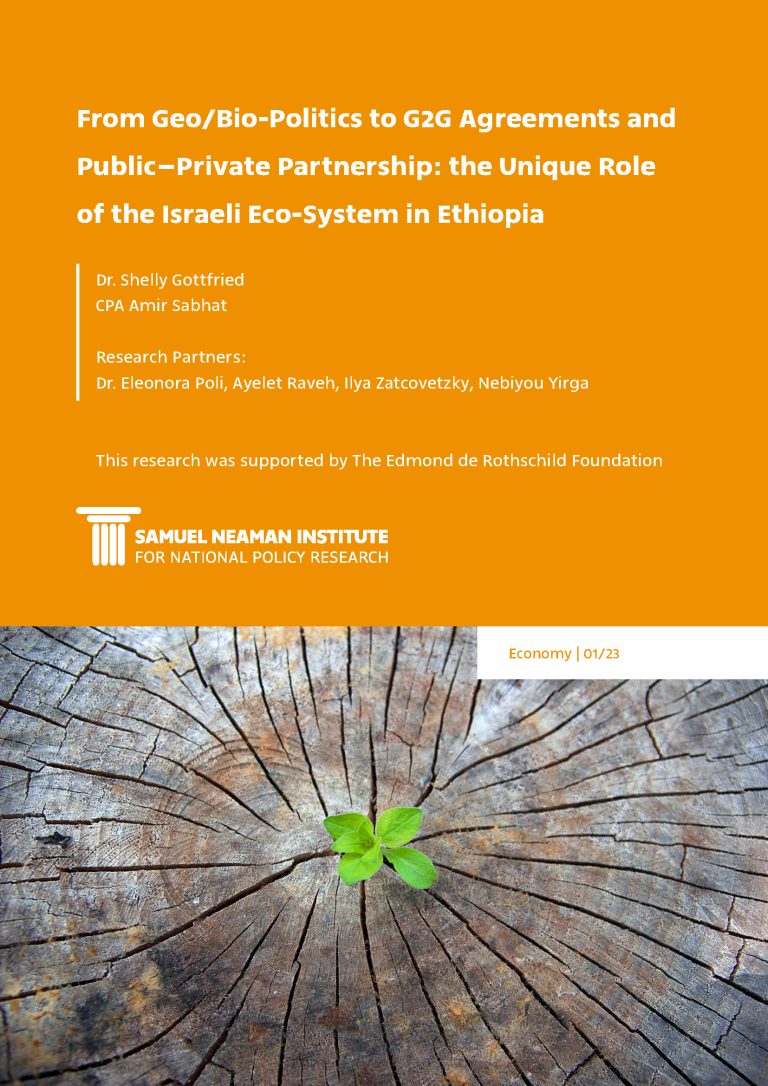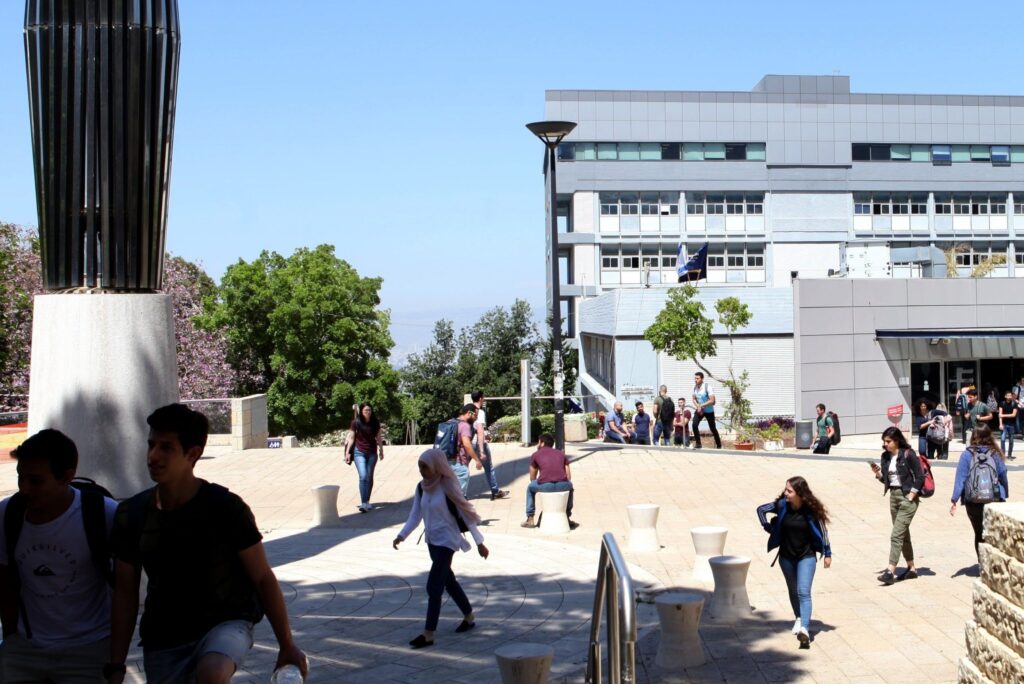The Purpose and Contribution of the Study
Israeli–Ethiopian relations were first established in 1956. Israel has traditionally regarded Ethiopia as an important country, both politically and geo-strategically. The relationship has been characterized by the dominance of the state. The first instance of this dominance was the involvement of both governments in the massive waves of immigration of Ethiopian Jewry to Israel. Second, since the early 1990s, the role of the state was manifested in Israel’s geopolitical strategic interest in the region and in the regimes surrounding Ethiopia, and in Ethiopia’s interest in Israel in the framework of its own accelerated development track.
The state-led initiatives resulted in political alliance and institutionalized economic collaboration, mainly in the fields of technology and agriculture. However, the real progress in the relationship has been made outside the formal governmental framework, through private-sector players on both sides that have been establishing intensified links and exchange in mid-tech fields such as agriculture, infrastructure, healthcare, water-tech, heavy industry, and communication. Furthermore, since both states share similar political–economic features—strong ties between the state and the market, with the wide control of the former and the ascent of the latter—this relationship is designed, to a large extent, by tight Public–Private Partnership (PPP).
Today, the relationship between Israel and Ethiopia is an important concern of national policy. Ethiopia is a key country in the Israeli relationship with the continent, both politically and economically. A series of government decisions during 2014–16 emphasized the need to strengthen the relationship between Israel and Africa by reinforcing diplomatic ties, expanding commercial partnerships, and diversifying market collaboration. Nevertheless, the relationship between Israel and Ethiopia, specifically the linkages between the public and the private sectors, though increasingly covered in the media and in government and business reviews, has not been studied in the academic arena; nor have these linkages been analyzed through a comprehensive, in-depth, and versatile political–economic prism. As a result, key issues that will determine the nature of this relationship in future, such as the Ethiopian central developmental channels with respect to Israeli competence, internal economic conflicts on both sides that could affect trade relations, and political–economic challenges that shape power structures, are dealt with in a rather contingent and random fashion or remain unaddressed. Since this relationship, in the public as well as the private spheres, has proved fruitful and is strategically important to both parties, the research aims to analyze it and provide tools for long-standing and sustainable national policy.In the past decade, we witnessed a key variety of PPP strategies: impact investments, aimed to promote measurable positive social and environmental externalities along with financial returns. Indeed, the African continent, and Ethiopia in particular, seems to offer among the most exciting and largely untapped impact investment opportunities. Impact investments in the region have the potential to deliver a “change for Good,” which could help to overcome regional conflicts, create positive economic and social spillovers for the people, and generate financial returns for private actors. In the context of the Israeli entrepreneurship and innovation ecosystem, as well as the heightened debate on the critical importance of impact investment in current times, the region offers optimal grounds for such collaboration. Nonetheless, the Israeli impact ecosystem is reluctant to penetrate Ethiopia and collaborate with local companies there, and the potential is far from being fulfilled. One of the key reasons is the fear of the unknown, combined with a lack of success stories to draw inspiration from. The impact field in general and the Israeli role in it in particular have not been investigated sufficiently in academic scholarship. We find important business reports of international organizations, global agencies, and governmental offices, but there is no “one source of truth” to provide a more concrete review that can be translated into operational terms. The purpose of this study is to create an initial knowledge platform on that subject, delineating the main collaboration channels, identifying the key players, mapping the opportunities as well as the hurdles, and suggesting prospective routes of collaboration in the impact trajectory between the Israeli impact ecosystem and the Ethiopian arena. This, we hope, will enhance Israeli presence in Africa, develop business channels between the states and the designated sectors, and result in tighter political–economic ties.
The contribution of the study is thus three-fold. First, the study aims to advance and deepen the activity of the Israeli impact ecosystem in developing states. Second, it offers a broad suggestion for a national policy, to be aligned with existing efforts of the Israeli government and expanding those efforts to include the active key players and effectively elevate their business endeavors. The research is thus designed to advance and deepen the institutionalized economic links that serve strategic geopolitical and economic interests of both states, and to map the modalities through which private players could leverage the states’ interests and be supported by them, thereby positioning Israel as a significant player in the impact global arena. Third, the research sheds light on the Israeli–Ethiopian community, which is a substantial anchor in implementing and broadening the objectives of the Israeli impact ecosystem, thus strengthening social cohesion in Israel. This research is part of a global effort—academic, political, and economic—to acknowledge the critical dimension of impact in business activities, envisaging routes of collaboration between established markets and developing states. It is thus aimed to strengthen the transition from “do no harm” to do good and be able to measure, evaluate, scale, and trickle down the effects of such activities. The Israeli impact innovative sphere is a qualified leader to progress this shift of paradigm.
Research MethodsThe research combines four methods.
The first is a literature review, investigating the nature of impact investments and their enablers, from an International Political Economy (IPE) perspective. It focuses on New Institutional Economics (NIE) to analyze impact investments, specifically in Africa and Ethiopia.
The second method is a quantitative approach designed to provide a comparative picture of the Ethiopian economy with designated risks and opportunities for the Israeli impact ecosystem.
Three main tools are used in this method:
- An analysis of integrated indices, built with the aim of investigating a uniform quantitative expression for a variety of influencing factors
- An analysis of statistical data, mainly macro-level assessment of data and reports issued by international and Israeli organizations
- A micro-level analysis of a selection of Israeli companies operating in Ethiopia and Africa in order to derive a concrete outlook
The third method involved extensive fieldwork, conducted in Israel, Ethiopia, and Switzerland, designed to delineate the main impact routes, industries and sectors, governmental support in collaborations, processes executed, and key players. For this purpose, 79 interviews were conducted with stakeholders from a variety of impact domains, including government, state institutions, international organizations, NGOs, impact funds, impact organizations, academy, and commercial, consulting, and entrepreneurship bodies. The key questions posed were along the following lines of the activities in the African market: the key networks, communication channels, and position holders most relevant to the Israeli impact ecosystem; the main advantages and business benefits that the African market has to offer for the Israeli impact ecosystem; modes for evaluating profitability and sustainability for players active in Africa; sources employed to come up with these conclusions; the core needs and opportunities; the main obstacles; the current and prospective plans for governmental funding and assistance programs (national and international); and a comparative outlook with other developing economies.The fourth method is a data-driven optimization model, drawing on three key industries or sectors analytics: DH, agriculture, and fin-tech. By means of the data collected, built, and analyzed using data processing methodologies, the research offers a model for future collaboration between the Israeli ecosystem and the Ethiopian industry.
Main Findings and SignificanceThe main findings of the research, corresponding with the research methods, can be classified into four types:
IPE resolution, statistical results, operative recommendations, and data-driven conclusions. On the IPE front, there is a lack of well-needed enablers, such as sound institutions and reliable data, which makes it challenging for investors to create new, impactful business opportunities at a time when the UN’s Sustainable Development Goals (SDGs) set the bar high for future global economic development. The African continent in general, and Ethiopia in particular, is a fertile ground for impact investors, who, going beyond traditional investing paradigms, can measure the success of their investments through multiple factors, combining financial gains with the development of positive changes for societies and the planet. In this respect, the lack of full industrial development and the high population are, in theory, positive factors for impact investments in terms of revenue and the scalability of socioeconomic development. In Africa, more than in other regions of the world, impact investments could bring a real change for the better. While 16% of impact investors in Africa have been making impact investments for more than 20 years, for more than 50% of investors, interest in the region has started to surge only recently. The research highlights the intrinsic complexity of Africa. On the one hand, Africa represents one of the biggest untapped markets in the world, which could enable investors to earn unprecedented profits, especially since the African Continental Free Trade Area (AfCFTA) came into force. On the other hand, extreme poverty, high unemployment, limited access to credit, and the lack of infrastructure are among the main impediments to improvement in the local population’s living conditions and the creation of more homogeneous economic growth in African countries. Impact investments have a key role to play in this context. They could enable economic and social growth, helping Africa get closer to achieving the SDGs. The research, emphasizing the institutional level, suggests that enabling institutions would allow for a more fruitful and effective experience for both investors and the local population. In other words, to reach their full potential and navigate their way out of the current global economic crisis, African countries and Ethiopia in particular need to provide private actors with a set of key institutional settings that would allow them to enter the market more easily, invest, gain, and create a positive impact, all at the same time. Thus, governments need to push the impact investing sector to the top of their political agendas, developing sound financial institutions, opening their markets, and providing information, for example, by adhering to global networks. Indeed, as the NIE theories highlight, impactful economic actions can grow only when private actors find adequate conditions to optimize a well-defined “good change” and their financial returns.
The second type of findings are the statistical results of the comparative outlook of the Ethiopian impact economy. These results include the quantitative anchor of the unfriendly bureaucratic system for business and the weakness of the financial system in Ethiopia; the two most problematic indicators—protection of small investors and access to credit lines—are related to the latter. The steps that the Ethiopian government took in recent years to improve the business climate in the country are further delineated. This part further discusses the results disclosed in global indices, while illuminating core notions in analyzing these indices. For example, in the Economic Freedom Index, the Ethiopian economy does not receive a high score (ranked 143 out of 165 countries examined in the index). However, the research shows that the government’s activities pull the economy forward, for both the absolute value of the grades and progress over the years on these parameters. It should be noted, nonetheless, that this progress is vastly counterbalanced by indicators attributed to the lack of democracy and freedom in the country. In addition, focusing on the DH ecosystem in Ethiopia, the research proposes a SWOT (Strengths, Weaknesses, Opportunities, Threats) analysis that summarizes the key opportunities and the steps to mitigate barriers. Key findings include limited private sector innovation, a fragmented system, a donor-supported governmental DH ecosystem, and the exclusion of the full landscape of key pillars for the DH ecosystem. With respect to Israel–Ethiopia trade relations, the conclusion that emerges from existing data is that Ethiopia is not an attractive destination for young Israeli companies, a prevailing impact profile. However, with respect to companies operating in Africa, the picture is significantly different. Most of them are young (established between 2012 and 2022), and a significant portion of them is small (1–10 employees). We can infer from this finding that the availability of limited data, which reflects the small number of collaboration attempts, and the lack of success stories and guidelines have been deterring factors, in stark contrast to the actual potential. The statistical results allow us to conclude that on the one hand, the Ethiopian economy is neither strong nor improving and has a weak financial system. On the other hand, the Ethiopian government invests a lot of effort in improving the business climate and training professionals, resulting in evidently rising business potential in several domains, such as agriculture and infrastructure.
The third pillar—fieldwork—has yielded a series of operative findings, which were framed as recommendations for the Israeli impact ecosystem, governments, companies and investors. These findings include state funding, in the shape of tax relieves, special grants and direct funding, as well as diversification in the provision of risk mitigation insurance. A governmental data platform is crucial, and so is an institutionalized networking platform. In general, the state is to come up with disruptive innovative impact framework. For companies, these findings include the critical need for acquaintance and exchange, collaboration with local partners, and the creation of a trusted community of impact and a one-stop-shop intermediary body, which would help establish an exchange process and enable all the steps of its funnel. In terms of funding, mutual funding needs to be assured to strengthen collaboration. Long-term allocation of capital is a must, rather than building on quick wins. With respect to knowledge, the findings include the importance of prior investigation, and not on-the-job training, focusing on practices of access to local capital, the Total Addressable Market, the product–market fit, and the competitive landscape. The importance of sustainability and the key role of investors are further emphasized. In addition, the findings in this part include the main barriers to penetrating the market, the main advantages, key networks, and supportive plans. Finally, the fourth part draws on unique datasets on the startup eco-system in Ethiopia; a part of these datasets was structured for this research. This part assesses the main components of the impact startup ecosystem, including finance, human capital, culture, policy, markets, and support. It provides an overview of the different types of support systems, what they offer, how they are used, and key channels of the funding journey and environment. The regulatory framework under which the impact ecosystem operates and the recent and upcoming changes, entrants, and prospects are further assessed.The significance of all parts is in delineating a primary and unique “source of truth” for the Israeli impact ecosystem, assessing its core challenges as well as opportunities, in the light of the Ethiopian case study. This knowledge hub is further applicable for formulating national policy, state agencies’ strategies, and plans of investments and collaboration by various impact players.












